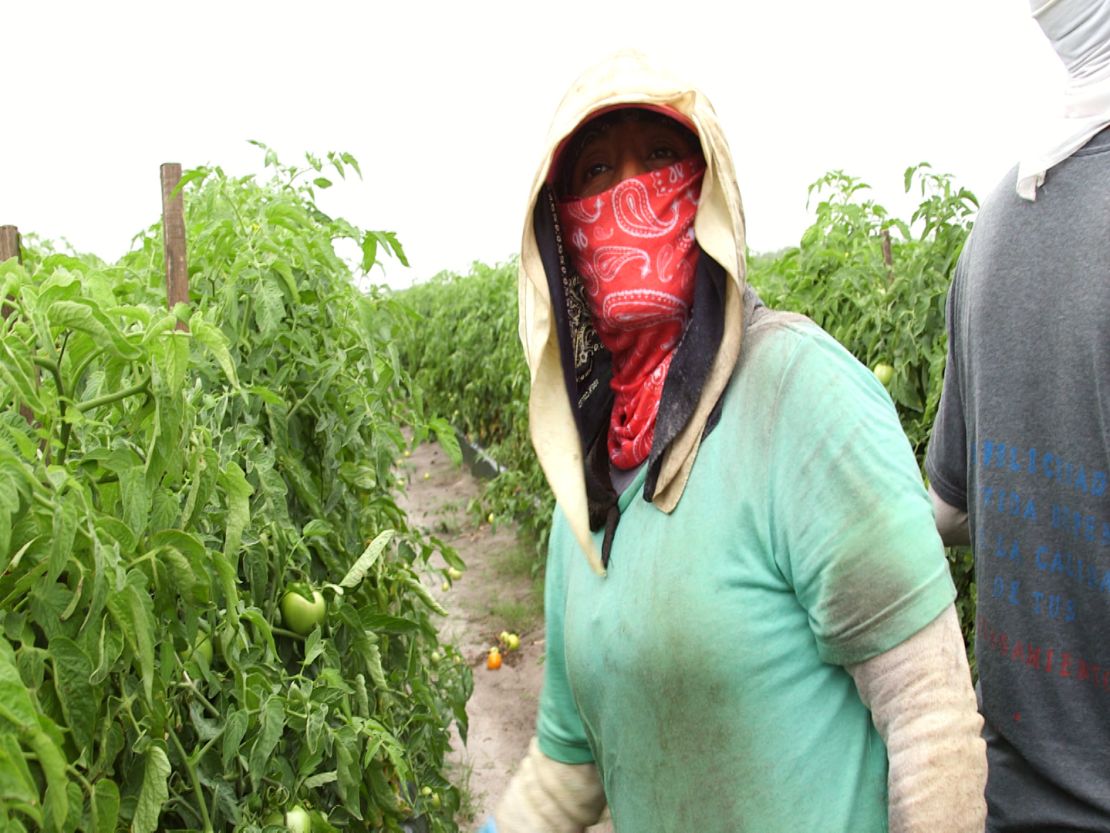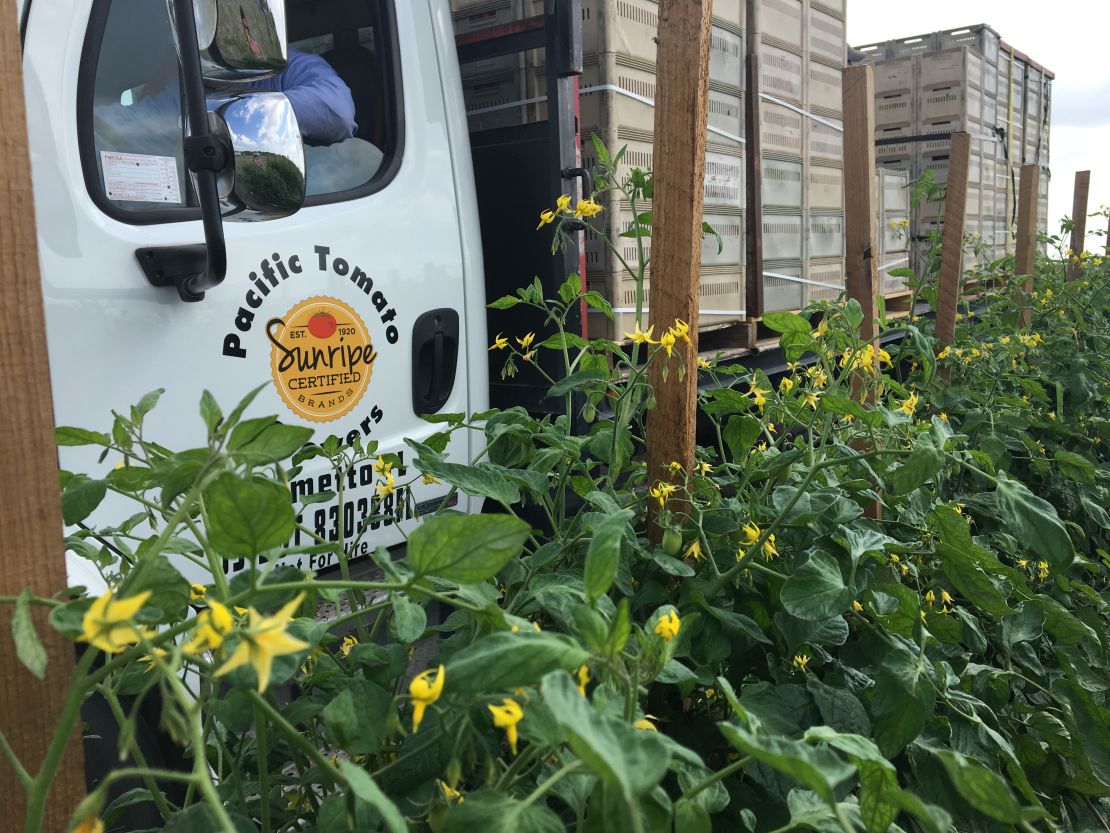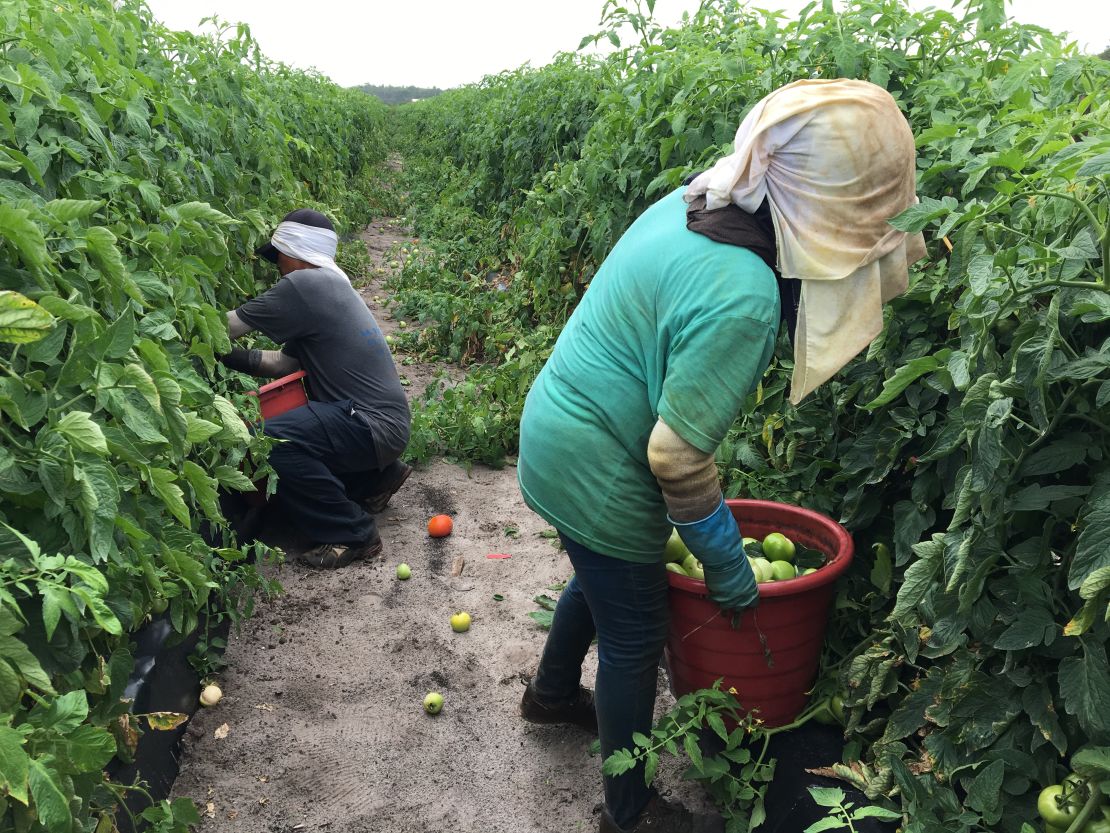Story highlights
Immokalee once known as 'ground zero' for modern slavery
Florida town epicenter of US tomato production
CIW nonprofit helped improve conditions of vulnerable workers
Alejandrina Carrera is covered from head to toe.
Long pants tucked into her shoes. Long sleeves tucked into her gloves. And layers of material covering her entire head and face, a protective shield against the brutal south-Florida sun.
Today, the oppressive heat is her only worry.
Yet that wasn’t the case when Carrera first came to the United States from Mexico 20 years ago, a migrant farmworker in search of a better life. She was just 14 years old, scared, vulnerable, and alone.
“I was very young, I didn’t have my father or mother, no one,” she says.

Carrera says she found work on a farm, and it wasn’t long before her supervisor tried to take advantage of her. He promised her an easier job inside a warehouse. But as soon as she got in his truck, she says, he drove to a remote part of the farm and tried to force her to have sex with him.
“He told me if we don’t do this the easy way, we’ll do it the hard way. I was afraid and trembling,” she says.
Now 35, Carrera recalls with gratitude the farmworker who heard her screams and rescued her before she could be raped. She also remembers how they both were fired the next day.
Protections against that type of labor abuse against migrant workers in the United States were virtually non-existent in the 1990’s.
“No one knew anything about rights,” Carrera says. “We didn’t seek out what our worker rights were. We just accepted everything they told us and just did our jobs.”

Coalition of Immokalee Workers
In 1993, a group of American activists and migrant farmworkers decided to change that. They founded the Coalition of Immokalee Workers (CIW), a non-profit grassroots organization dedicated to improving wages and working conditions of migrant farmworkers.
The organization is named after the migrant town of Immokalee, Florida, the epicenter of tomato production in the United States. Ninety-percent of all winter tomatoes consumed in the US come from Florida. Immokalee also used to be known as ground zero for modern day slavery.
CIW co-founder Laura Germino explains how the group evolved into an anti-slavery organization.
“We began to come across situations where workers were being held against their will, where they weren’t free to leave,” Germino says.

The first case they discovered was eventually prosecuted in a federal case called U.S. vs Flores.
“In that one, we found out that workers were being held by armed guards, prevented from leaving, pistol whipped, some sexually assaulted, and it was a crew of 500 workers,” says Germino.
Germino says she and her colleagues initially thought it was just a single case. An anomaly, she says.
“But then we came across another case and another case and that’s how I became introduced to labor trafficking.”
Read: Vets hunt child predators
Read: Trafficking survivor who smashed triathlon record
Read: Transgender women at risk of sex trafficking
Since that first case, the CIW has uncovered and helped the US government successfully prosecute eight cases of slave labor on Florida farms.
The cases are highlighted in a mobile museum that Germino uses to educate people about the issue.

Fair Food Program
Today, the CIW’s focus is no longer uncovering cases of slavery. Instead, it’s aim is preventing them from happening in the first place through an initiative it calls the Fair Food Program.
Participants in the program, which include 90% of tomato growers in Florida, allow CIW staff to come onto their properties and hold mandatory education sessions for all employees. The workers receive booklets that outline their rights and a hotline to call if they experience violations.
The growers also agree to regular third-party inspections of their farms. When they visit, a team of auditors speaks confidentially with at least 50% of workers to ensure their rights are being respected.

Laura Safer Espinoza is a former Supreme Court Justice for the State of New York. She now spends her retirement in Florida, running the Fair Food Standards Council, which oversees the audits.
“Places that were called ground zero for modern day slavery by federal prosecutors a few years ago are now cited by national and international human rights experts as the best work environment in U.S. agriculture,” she says.
Judge Laura, as she is affectionately called by everyone who works with her, says the code works because it was created by the very people it is designed to protect.
“The code that we get to monitor and enforce is unique because it was written by workers who are the ultimate experts on human rights in the agricultural settings in which they work.”
The program also includes real market consequences for farms if violations are found.

As Judge Laura explains, “if a participating grower is not complying with the code of conduct after multiple chances and opportunities with the Fair Food Standards Council to work toward compliance, ultimately they are suspended. That means they cannot sell their produce to now 14 major retail buyers.”
Those buyers include many of the biggest fast food restaurants and grocery stores, including McDonalds, Taco Bell, Whole Foods Market and Walmart. As part of the agreement, they all pledge to purchase tomatoes only from Fair Food Program farms.
They also agree to pay a penny more per pound of tomatoes, money that goes directly to the farmworkers as a line-item bonus. In some cases, it doubles their paychecks.
Alejandrina Carrera appreciates the extra money, but is most grateful for the change in how she is treated on the job.
“You’re not going to be harassed, you’re not going to be insulted, you’re not going to be forced to work. There’s more respect now,” she says.
Learn more about the fight against human trafficking with CNN’s Freedom Project
Carrera came to Immokalee dreaming of a better life for herself. Today she dreams of a better life for her three children. They are all in school and she wants them to go on to college and have careers.
Her youngest kids are seven and nine. The oldest is 14, the same age she was when she first came to Florida.


